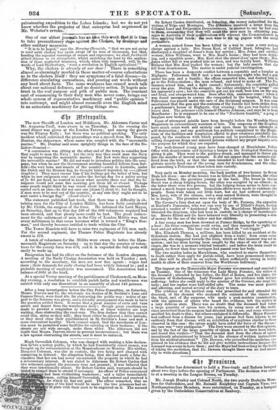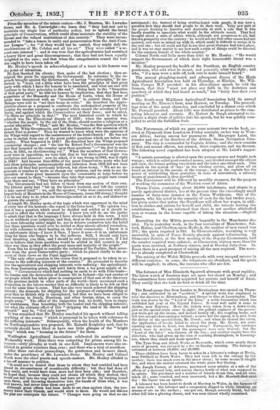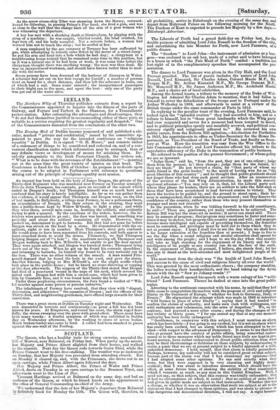,tit Vnittiurto.
Manchester has determined to hold a Free-trade and Reform banquet about two days before the opening of Parliament. The decision was come to at a meeting in the League Rooms, on Tuesday.
Mr. Joseph Henley and Colonel North, the two purely Derbyite Mem- bers for Oxfordshire, and Mr. Rainald Knightley and Captain Vyse, two Northamptonshire Members, were entertained, on Tuesday, at a banquet given by the Oxfordshire Conservatives at Banbury, From the speeches of the minor orators—Mr. J. Stratton, Mr. Lewndes stone, and Mr. A. Cartwright—we learn that " they had met not to maintain one single line of particular policy, but to uphold the broad principle of Conservatism, which could alone maintain the stability of the throne and the valued institutions of this country." They were recom- mended to " take a lesson in unity and perseverance from the Anti-Corn- law League" ; for " if they would but be united, they might defy the machinations of Mr. Cobden and all his set." They were -called " a se- cond-rate interest " : and it was true that the agriculturists had sustained a heavy blow and great discouragement ; that they had not been equally weighted in the race; that when the compensation ceased the bur- den ought to have ben taken off.
Mr. Henley's speech in acknowledgment of a toast in his honour was the point of attraction.
lie first thanked his clients; then spoke of the last election ; then ar- raigned the press for opposing the Government. In reference to the re- proach brought against the Government, of having "no principles," he un- dertook to "trace out a little what have been the principles of that great party with which I have the honour to be associated, and what are and will continue to be their ,principles to the end." Going back to the "formation of that great party," he told his hearers by implication, that they had been supporters of the Monarchy and the House of Lords, when the House of Lords was threatened with an "inundation" to control them, and the Bishops were told to "set their house in order." He described the Appro- priation-clause as a proposal to confiscate the ecclesiastical property of the country for secular purposes; a proposal which caused the secession of Lord Derby, and against which the Conservatives set their faces ; and he asked, "Is there no principle in that ? " The next historical event to which he referred was the Educational dispute of 1839 ; when the question was, "whether the people, by the aid of the State, should receive a religious or a secular education.' "That," said Mr. Henley, "was the Ilitt question which shook the Whig Government, and laid the foundation of the accession of Sir Robert Peel to power." Then he wanted to know what were the opinions of the Whigs with regard to the maintenance of the Irish Church ? He was not going to shrink from any of the great public questions which are before the country. What happened in 1840? He described how the Whigs proposed commercial changes ; and " the late Sir Robert Peel's Government was the first that hounded on the country upon those questions "—" the first to make them, in 1841, an electioneering cry." When the members of that Govern- ment were in opposition, we were told that to buy slave-grown sugar was irreligious and immoral : now he asked, if it was wrong in1845, was it right in 1846? And because four-fifths of the great Conservative party who had held those principles uninterruptedly and unbroken from 1832 did not turn round on all they had previously believed, but chose to say, " We see no ar- guments or reasons to make us change our opinions, and we wish to see the operation of those great measures upon the community at large before we give our assent to them "—because they take that course, people turn round upon them and say, "They have no principles."
The Government had not fallen to them from any motion of their own. The Liberal party had "hit up the Queen's business, and left the Country to take care of itself" : we, said the speaker, "who were connected with the largest body of Members in the House of Commons, (some 250 strong,) thought it to be our duty to do what our Sovereign called on us to do, and endeavour to govern the country."
At length Mr. Henley spoke of the topic which was uppermost in the mind of every one of his hearers—the repeal of the Corn-laws. "My opinion Was, that it was a question which must be decided and settled as it should be proved to affect the whole community. I know you will do me the justice to admit that that is the language I have always held in this town. I told you to withhold your judgment, and that, deep as the pressure and difficult), you were labouring undet might be, not to deceive yourselves into the belief that these questions would ever be settled as they merely affected yourselves, but with reference to their bearing on the whole community. I know it is an unfortunate thingI knew it then, I know it now—it it an unfortunate thing for those who happen to be the sufferers. Still, I should only have been deceiving you then, and I should be only deceiving you now, if I led you to believe that these questions would be settled in this country in any other way than as they affect the great mass and majority of the people." From this he diverged to consider the isolation of the Peelites, their sever- ance from the great Conservative party ; which he placed chiefly to the ac- count of their views on the Papal Aggression. " The only other question is the course that is proposed to be taken in re- ference to the suffering interests of the country." He proceeded to describe how the agricultural and shipping interests were suffering : the agricultural- ists, from fluctuating prices, and until lately from a too great supply of la- bour. " Circumstances which had nothing on earth to do with Free-trade- the famine and the destruction of human life in Ireland—the vast exodus of ourpeople which has taken place in consequence of that and of the discovery of the precious metals in other parts of the world—haire occasioned such a diminution in the labour-market that no difficulty is likely to be felt on that head for some time to came. That has also very much relieved the shipping interest ; the demands for shipping for the purposes of emigration being so great that no British ship 'is unemployed, but that we have been obliged to have recourse to Dutch, Hamburg, and other foreign ships, to carry the people away." The effect of the emigration had, no doubt, been to empty our workhouses, thus benefiting both the landed and the shipping interest,. but what the ultimate effect of this " stripping the land of its sinews and strength" may be, "God only knows."
It was remarked that Mr. Henley concluded his speech without telling anything of the course " which is proposed to be taken with reference to the suffering interests." Subsequently, when the health of the Members for Northamptonshire was proposed, Mr. Rainald Knightley said that he certainly should have liked to have one little glimpse of the " bright thing" which was " looming in the future" for them.
Wallington Agricultural Association celebrated its anniversary on Wednesday week. Here there was competing for prizes among the la- bourers—sixty ploughs at work in one field. Implements were also ex- hibited in greater numbers than ever ; and there was a trial of scarifiers. After these out-door proceedings, the gentlemen and farmers dined, under the presidence of Mr. Lowndes Stone. Mr. Henley and Colonel North were the chief guests and speech-makers. Mr. Henley alluded in a far-off manner to politics.
"It could not be denied that those in whom they had confided had been placed in circumstances of considerable difficulty ; but they had done all they could, and would have done more had they been able; and therefore, he hoped that, because they could not obtain all which they desired, they would not fall into the trap which had been set for them, by turning round upon them, and throwing themselves into the hands of those who it was well known, had never done them any good." Although great efforts had been made to set class against class, the yeo- manry knew their friends, and would stick to them. He would not discuss the peat nor anticipate the future. " Changes were going on that no one anticipated ; for, instead of being overburdened with people, it was now a question how they should find people to do their work. They saw part of the people flocking to America and Australia at such a rate that it was hardly possible to speculate what would be the ultimate result. That had brought about a state of affairs which, although not prosperous to all, had thrown prosperity over the country : he would not say that other causes bad not assisted, and were so mixed up with it, which made it difficult to assign it to the real one ; but all could not fail to see that great changes had taken place, and it was no easy matter to see how such a state of things could be directed for the common benefit of the whole country." Colonel North said little more than ditto to Mr. Henley : "He would support the Government of which their right honourable friend was a member."
Mr. Henley proposed the health of the President, ah English country gentleman, who said what he meant, and generally what was right ; and who, " if a man were a mile off, took care to Make himself heard."
The annual ploughing-match and subsequent dinner of the Herta Agricultural Association was held on Thursday, at Hitchin. Mr. Wil- liam Cowper M.P. presided: in his after-dinner speech he told the farmers, that they must not place any faith in the doctrines and quackery of which they had heard so much," but "fairly face their own position."
The South-west Middlesex AgriculturarAssociation held its annual meeting on Mr. Elmore's farm, near Harrow, on Tuesday. The proceed- ings were of the usual character, and concluded by a dinner over which Mr. Pownall presided. About 1521. was distributed as prizes to the com- peting labourers and servants. Mr. Hubert de Burgh attempted to in- sinuate a slight shade of politics into his speech, but he was quickly com- pelled to avoid the forbidden fruit.
The Forerunner, of which we gave some account two weeks back, ar- rived at Plymouth from Londonon Friday sennight, on her way to West- em Africa; baying among her passengers Mr. Macgregor Laird, the founder and one of the directors of the African Steam Navigation Com- pany. The ship is commanded by Captain Atkins; and the crew consists of first and second officers, ten seamen, three engineers, and six firemen. The following novel expedient has been adopted at Mr. Laird's sugges- tion.
"A certain percentage is allowed upon the passage-money and freight each voyage ; which is called good-conduct money, and divided amongst the officers and crew, the former getting two-thirds and the latter one-third each. This is much on the system of ' lays' in the whaling service, and gives all on board an interest in the success of the voyage ; and, as the captain has the power of withholding these gratuities in cases of misconduct, a salutary i means of punishment is thus provided."
The Forerunner will be followed by monthly steamers, for the purpose of working the commerce of the Western coast of Africa.
Thorne Union, containing about 20,000 inhabitants, and situate in a purely agricultural district, has at the present time the exceedingly small number of forty-hine inmates in the Union Workhouse. One of the paupers, who has acted in the capacity of cook for the last twelve years, has given notice that unless the Guardians will allow her wages, in addi- tion to clothes and rations for herself and child, she intends leaving the establishment. We are informed that there is not another ahlebodied man or woman in the house capable of taking the situation.—Shejidd Times.
Recruiting for the Militia proceeds languidly in the Manchester dis- trict. Up to yesterday week, in the four townships of Manchester, Sal- ford, Hulme, and Chorlton-upon-Mediock, the number of Men raised was 201; the quota required is 930. In Gloucestershire, recruiting is very successful, in spite of Peace Society placards against volunteering. In Gloucester district, at the first meeting of the Deputy-Lieutenants, half the number required were enlisted ; at Cirencester, sixteen more than the quota were received, at Sodbury sixteen, and at Dursley forty-four. In Essex there is a good prospect of raising all the men required. The num- ber is already completed at Chesterfield.
The raising of the Welsh Militia proceeds with very unequal Success in different counties : in seine, the volunteers are abundant, and the quota will be supplied ; in others, the recruits who offer are few.
The fortunes of Miss Elizabeth Squirrell alternate with great rapidity. The latest watch of fourteen days set upon her closed oh Monday ; and the coramittees have entirely acquitted her parents and herself of fraud. They certify that she took no food or drink all the time.
The Broad-gauge line from London to Birminghant was opened on Thurs- day ; and celebrated by an "accident." A special train was employed to take the directors to Birmingham, and thence to dine at Leamington. The train was drawn by the "Lord of the a noble locomotive which was exhibited last year at the Crystal Palace. It went well until it came to Aynho, near Banbury. Here the tickets were taken from a down-train, just as the special-train came in sight: thegallant engineer of the passen- ger-train got up the steam, and dashed hastily off; the coupling broke, and left two second-class carriages behind ; a curve hid the signal, it is said, from the driver of the special-train, Mr. Gooch ; and when be cleared the curve, the application of breaks failed to arrest the train : Mr. Gooch, not anti- cipating any train in front, was dashing away. Fortunately, the carriages struck were in motion, and the passengers were only bruised ; but the "Lord of the Isles" was thrown off the line; and another engine bore the directors, who had given up the idea of reaching Birmingham, to Leaming- ton, where they dined and made speeches.
The Tyne Soap and Alkali Works at Newcastle, Which cover nearly three acres of ground, was ravaged by a fire en Sunday Mornings The damage is estimated at between 10,0001. and 20,0001.
Three children have been burnt to ashes in a labourer's cottage at Nevin, near Pwllheli in North Wales. They had been left in the cottage by the mother; there was much corn in the straw about; by some means it taught fire, and when the mother returned the whole place was blazing.
Mr. Joseph Turner, of Ashover, purchased some articles at a sale of the effects of a deceased lady, and among theme bottle of what was supposed to- be spirits. The purchaser and a number of friends drank this, and all were taken ill ; some vomited, and soon recovered, but a Mr. Marriott died next, day : the liquor was an opiate.
A labourer has been burnt to death at Maesteg in Wales, in the furnace of an iron-work : the labourer and a companion slipped in while breaking up masses of ore on the surface ; one got out, though severely burnt, but the other fell into a glowing chasm, and was soon almost wholly consumed.
As the screw steam-ship Tiber was steaming down the Mersey, outward- bound for Gibraltar, in passing Prince's Pier head, she fired a gun, and was so close to the wall that the charge blew off the arm of a poor woman who was witnessing the departure.
A boy has met with a shocking death at Birmingham, by playing with the strap of a machine he was caught, whirled round, his head crushed, his legs torn off, and his body mangled. Not a minute before, a woman had warned him not to touch the strap ; but he scoffed at her.
A man employed by the gas company at Torquay has been suffocated by gas, while attempting to remedy some defect in the meter of a street-lamp : he put his arm and head into a hole which be had dug ; a clergyman in a neighbouring house noticed that he remained some time in this position, but as it was a natural one if he had been at work, •it was some time before the clergyman thought there was anything wrong : the man was then dead. He was an inexperienced workman, and should have known better than to med- dle with the meter.
Seven persons have been drowned off the harbour of Aberayon in Wales. A schooner had set out on her first voyage for Cardiff ; a number of persons went on board for a short distance, and then left the schooner in boats, one of which had a sail. Some water entered ; the inexperienced passengers in their fright ran to the mast, and upset the boat : only one of the party was got out of the water alive.




























 Previous page
Previous page